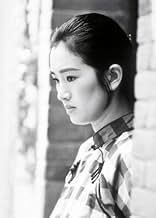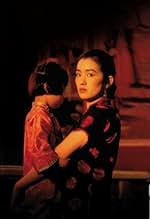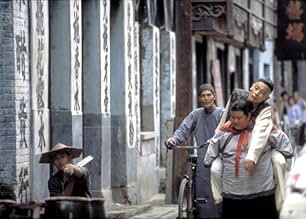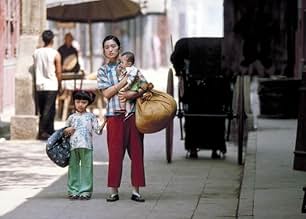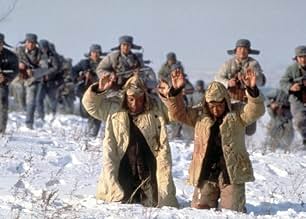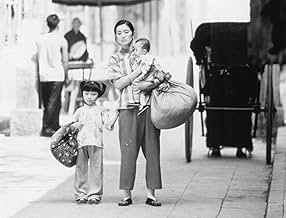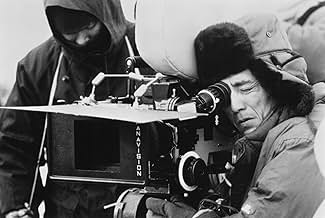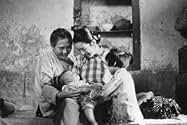Après la perte de leur fortune personnelle, Fugui et Jiazhen élèvent une famille et survivent aux changements culturels difficiles des années 1940 à 1970 en Chine.Après la perte de leur fortune personnelle, Fugui et Jiazhen élèvent une famille et survivent aux changements culturels difficiles des années 1940 à 1970 en Chine.Après la perte de leur fortune personnelle, Fugui et Jiazhen élèvent une famille et survivent aux changements culturels difficiles des années 1940 à 1970 en Chine.
- A remporté le prix 1 BAFTA Award
- 5 victoires et 6 nominations au total
Avis en vedette
It is easy to dismiss this movie as a "Sad period piece," but with another look, one sees that this is a story about triumph... of taking heart in the fact that one lives. The title, "To Live," is very apt, as we see the rises and falls of one small family living through the ups and downs of China during the pre-revolutionary era, the civil war, the Great Leap Forward, the Proletariat Cultural Revolution, and beyond.
This movie is at turns dramatic, humorous, touching, chilling, heart-wrenching, and triumphant. A true roller coaster of emotions, played out in the subtle tones only Chinese film can truly capture.
I watched this movie because I was taking a class on the politics of China. When I saw that this movie covered such an expansive time period I thought "great, I will learn something." That I did. I cried, I cheered, I stayed up very late... I made my then future husband watch it... he liked it too, not as much as I do.
I tell everyone in conversations about movies that this one is my all time favorite. It took the place of American Beauty, a movie that I have watched about eleven times.
So, I recommend it. If I had a lot of money I would pay people to watch this. It is THAT great.
Both leading actors nicely portray the way their characters change over the years. At first, Fugui is the stereotypical "callow young man" and Jiazhen the even more stereotypical "long- suffering wife," but the screenplay and actors eventually deepen the characterizations.
The best sequence of the film covers the Chinese Civil War. Wisely, Yimou Zhang resists the temptation to make the movie too epic, and instead focuses on Fugui's personal experiences. The result is a very moving depiction of the human cost of war. In another striking touch, Fugui's hobby is singing with a shadow-puppet troupe. The puppets not only provide an interesting glimpse into traditional Chinese culture, they also take on a symbolic meaning.
After watching "To Live," it's easy to see why the Chinese authorities banned it: there's a lot of tragedy in the film, and in most cases, Communism is to blame. Remarkably, though, Zhang also makes many of the Communist characters sympathetic. For instance, Fugui and Jiazhen's daughter marries an officer in the Red Guards, who is a little ridiculous in his devotion to Mao Zedong, but not a villain. This is in keeping with the overall spirit of "To Live"--humanistic and subtle, instead of bombastic or propagandistic. It's both an important examination of recent Chinese history, and a universal story about how individual human beings manage "to live" in times of hardship. A rare combination, and one well worth seeing.
TO LIVE (aka LIFETIMES - I dunno what the Chinese name is) basically covers 3 or 4 decades of one family's life in China, in a period that saw not one but two revolutions, and looks at the effect the social upheaval had on ordinary people's lives. The film rarely criticises the political movements instigated by Mao Tse Tung, but does an effective job of showing the hellishness of a society that has been turned on its head, where the people are forced to change not just the way they live but the way they think, and people are forced into social relationships that are new, and quite possibly against human nature.
I hope I won't jeapordise my visa if I admit that I had strong leanings towards Communism when I was younger, having read Marx in philosophy classes. His picture of a society without private possessions or social hierarchy did seem very appealing, but Marx acknowledged that the only way for such a society to work was if every member saw the value of it and willingly took part in it, and admitted that the only way that was likely to happen was via massive revolution - i.e. killing everyone that didn't agree with the plan. As a teenager, that didn't seem like such a big price or problem
Certainly I'm not the only person to have considered this price worth paying, and a couple of people have actually put the plan into practice - lamentably with less than stellar results. Mao Tse Tung is, I guess, the undisputed king of Communist revolution, having led TWO of them in China, and probably disrupting more peoples' lives than anybody else in history in the process. TO LIVE gives those of us that haven't had to live through such conditions some idea of what it might have been like. People used to the cushy capitalist western lifestyle might wonder just how on earth people can live through conditions like that, but that's the what the film wants to say... life might deal you some crappy hands, but people are remarkably adaptable and resilient, and you've just got to try to live the best you can. It sounds remarkably trite put like that, but the film does a good job of expressing it.
The film is based on a novel, with the author co-writing the screenplay as well. Zhang Yimou directs brilliantly as usual, which in this case is to recognise the strength of the story and characters and to back off a little, giving them space to live their lives. Although the film looks great throughout, the cinematography is quite unobtrusive. He once more elicits a great performance from Gong Li and the rest of the cast, with leading man Ge You giving the best one of all. The film has occasionally been criticised for throwing piling too much tragedy on, but this is never done in an exploitative/manipulative way, and Zhang Yimou avoids turning to melodrama to evoke an audience reaction... which makes him all the more likely to get one (and without the audience feeling used afterwards).
In a career full of magnificent films, TO LIVE stands as one of Zhang Yimou's finest moments. The film is epic yet remarkably simple, and the execution is as near to flawless as I've seen. I doubt that even Akira Kurosawa could have handled the material better, which is to say that Zhang Yimou surely ranks in the world's top echelon of film-makers. Long may his life and career continue
Highest recommendation!
Most Chinese who lived through Mao's Revolution say this film tells it like it was at the simple townsperson level. Though it can serve as an overview of Chinese history 1944 to 1970 or so, unlike Lean's "Gandhi" or "Lawrence of Arabia", this is not a hero's biopic. Instead we see a foolish, once rich but now fallen heir and his wife blown about by the winds of fortune for three decades and challenged as parents trying to raise two children under increasingly harsh and punitive communist tyranny. What you sense in this film, that I've never seen before in any Chinese film, is how the ethical and moral principles that have prevailed in Chinese culture for 2500 years - a mix of transcendence and pragmatism, humility and grit, cosmic harmonic balance and social duty - allows an ordinary couple to accept unbearable tragedy and keep going. It also shows what this survival strategy costs them in their Communist context. The screenplay is full of cosmic irony. It makes us aware, without shouting, that this is just one family among millions. As Yimou's transitional screen message says: "...leaving no family unaffected". It is to that extent, a tribute film.
Maybe ten hours of Kieslowski's "Decalogue" might accomplish the same broad survey of of human happenstance and emotion. Maybe Kurosawa in three or four hours. But never in two plus hours have I seen the scope Zhang Yimou achieves here. "To Live" also contains as wise a moral lesson as any film I've seen, and it's a gentle one despite the surrounding violence. I couldn't paraphrase the lesson for you. I wouldn't try. Just watch. It will reach you non-verbally in about 90 minutes. Just know, this isn't Shakespeare, Hollywood or soap opera. It's something else.
Gong Li's work is as powerful as anything Streep or Sarandon have ever done in the west - which is all the more inspiring since the camera doesn't lavish star-level attention on her. As her husband, Ge You turns in an emotionally riveting, charming, sometimes funny and devastatingly honest performance. The direction is sure handed, the shooting unfailingly gorgeous. Zhang Yimou's cinematic canvass has never been so big or his palette so colorful and controlled. Full of spectacle, great sweeps of time and onrushing tides of humanity, "To Live" is still, in the end, a sweet and poignant epic with an intimate, observant heart. Great story telling. Do not miss! Try to view a letterbox version on a big screen.
Le saviez-vous
- AnecdotesInitially, Director Zhang Yimou was forbidden from filmmaking for 5 years by the Chinese Communist Party as a result of making this film. However, due to outside pressure this was later withdrawn.
- Citations
Little Bun: [playing with chickens] When will they grow up?
Xu Jiazhen: Very soon.
Little Bun: And then?
Xu Fugui: And then... the chickens will turn into geese... and the geese will turn into sheep... and the sheep will turn into oxen.
Little Bun: And after the oxen?
Xu Fugui: After oxen...
Xu Jiazhen: After oxen, Little Bun will grow up.
Little Bun: I want to ride on an ox's back.
Xu Jiazhen: You will ride on an ox's back.
Xu Fugui: Little Bun won't ride on an ox... he'll ride trains and planes... and life will get better and better.
Meilleurs choix
- How long is To Live?Propulsé par Alexa
Détails
Box-office
- Brut – États-Unis et Canada
- 2 332 728 $ US
- Fin de semaine d'ouverture – États-Unis et Canada
- 32 900 $ US
- 20 nov. 1994
- Brut – à l'échelle mondiale
- 2 332 728 $ US
- Durée
- 2h 13m(133 min)
- Couleur
- Mixage
- Rapport de forme
- 1.85 : 1


